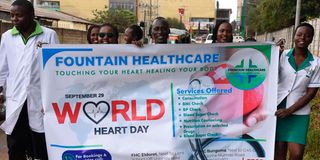Women ‘discriminated’ in heart treatment

World Heart Day Marked: A section of nurses and other employees at Fountain Healthcare Hospital in Eldoret town, Uasin Gishu County during a procession in Eldoret to mark this year’s World Heart Day on September 29, 2022. People were encouraged to do sugar, blood pressure and cholesterol tests at least once a year to help check on heart related diseases, and also exercise regularly. PHOTO| JARED NYATAYA
A new study presented at the European Society of Cardiology has revealed that doctors believe that men and women are treated differently when it comes to preventing heart disease, and that doctors may prescribe medication less frequently to women to prevent cardiovascular disease.
Researchers examined data from the National Health and Nutrition Examination Survey gathered from 2017 to 2020, which consisted of interviews and physical examinations to assess the health of children and adults in the United States.
The study involved 8,512 healthy participants aged between 40 and 79 years, who were tested to establish the possibility of developing cardiovascular disease (CVD) in 10 years. Of the total, 2,924 had a score indicating an increased risk for CVD development that qualified the patients to receive statins, which help to reduce illness and mortality from CVD.
Study author Prima Wulandari, a cardiology clinical researcher at Harvard Medical School and Massachusetts General Hospital, then sought to calculate the odds of male participants being advised to lose weight, attend statin therapy, exercise, reduce salt intake and reduce fat or calories consumption.
The results showed that men are more likely to be prescribed statins than women to prevent heart disease. Doctors were also 27 per cent more likely to tell female patients to lose weight and 38 per cent more likely to advise female patients to exercise than male patients. As for diet, female patients were 27 per cent more likely to receive instructions to cut salt intake and 11 per cent more likely to be told to cut fat or calories than male patients.
“Our study found that women are advised to lose weight, exercise, and improve their diet to avoid cardiovascular disease but men are prescribed lipid-lowering medication,” said Dr Wulandari.
Other participating doctors, including Dr Martha Gulati, director of preventive cardiology at the Smidt Heart Institute at Cedars-Sinai in Los Angeles and Dr April Stempien, a cardiologist at the Heart Institute at UW Medical Center, noted that female patients are less likely to be prescribed statins by their doctors compared to male patients.
“We allow women who have high blood pressure to be untreated. We see it attributed to stress, but still, medications aren’t prescribed. Even after a woman has a heart attack, she is less likely than a man to get guideline-directed therapies. Having a heart attack should be enough to get you all the life-saving medications. But it is not the case for women, and we know this globally,” Dr Gulati said.
“We have other data supporting that we treat men more aggressively than women for both primary and secondary prevention of cardiovascular disease. Statin and lipid-lowering therapies are particularly under-utilised in women,” she added.
She also noted that biological sex or gender should not be a determining factor when prescribing medical and behavioural interventions to patients with a higher risk of developing heart disease.
“I wonder whether some healthcare professionals may perceive that women are at a lower risk for heart disease, despite the similar risk scores for both men and women. Do we think women will be more able to change their lifestyle? Or that they have more potential lifestyle [or] behaviours that should be modified compared with men?” asked Dr Gulati.
“The risk for cardiovascular disease remains underappreciated in women. And women remain undertreated. It should be no surprise if we continue to approach women so differently from men, in terms of aggressiveness of treating cardiovascular risk factors, we will continue to have this preventable disease continue to rise in women” Dr Gulati added.





